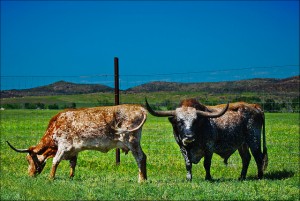Oklahoma’s Kiowa Tribe Says Gravel Mining Will Ruin Sacred Mountain
-
Logan Layden

Jaxalude / Flickr
The Kiowa Tribe is worried about the impact of gravel mining on Longhorn Mountain, near the Wichita Mountains Wildlife Reserve in southwestern Oklahoma.
For almost 150 years, the Kiowa Tribe has used Longhorn Mountain for ceremonies and to gather the cedar used to purify their homes. But tribal leaders say the sacred site is being threatened by gravel mining.
Two of the mountain’s five private landowners have leased water and property rights to Cushing-based Material Service of Oklahoma, Inc., the Associated Press’ Kristi Eaton reports.
Kiowa historian Phil Dupoint says the tribe has had a “gentlemen’s agreement” with the private landowners over the years, but fears that won’t be possible once the company starts mining for gravel, which the tribe believes could start by the end of the summer based on a newspaper ad seeking workers for a rock crushing plant at Longhorn Mountain.
“We’ve got so many people who are concerned. It’s not federal land. It’s not trust land. We can only go so far,” said Dupoint, who has been researching the issue with Amie Tah-Bone, director of Kiowa Tribal Museum.
The land was originally assigned to the tribe when the Kiowas were relocated to Oklahoma in the mid 1800s. Later, it was allotted to individual tribal members who eventually sold their plots to private owners, many during the Great Depression.
Still, the Kiowas were able to use the mountain.
In an earlier story from the Indian Country Today Media Network, Tah-Bone related the difficult position the tribe finds itself in:
“It’s a hard and complex situation,” said Tah-Bone. “We’re at a disadvantage. It’s not trust land. It’s not federal land. It’s privately owned land, and we don’t have a right to it. We thank the people on the eastern side for their generosity in letting us have access to it. They could throw us in jail for trespassing, but they don’t. We are working on it… and doing everything we can think of to stop it. It might take some time. We want people to know we’re doing the best that we can.”
But it’s not clear that anything can be done to stop the gravel mining. Tah-Bone says permits have already been issued through the Oklahoma Department of Mines, and work is scheduled to begin this summer.
The tribe is gathering signatures for a petition to save the mountain, and a Facebook site has been set up with the same goal, where those concerned can at least express their feelings, like in this post by the site’s administrator:
It may be difficult for non-natives to understand that Native Americans did not build churches, but had sacred places in nature where they went to pray and seek the presence of God.
The tribe is encouraging members to contact their elected officials on the state and national level, and has been talking with local farmers and other landowners about the potential environmental impact of the mining operation, which Indian Country Today article claims could be profound:
Dust from the mining activities on the west side have the potential to impact the area’s environment, ranging from reduction of air quality, damage to surrounding crops and livestock, and killing of the cedar trees on the mountain.
StateImpact reported on the effects of mining aggregates — limestone, sand, gravel, etc. — on the Arbuckle-Simpson Aquifer during the summer of 2012, and dust was one of the major concerns for people living near the mining — aside from the depletion of their drinking was source.
The Associated Press says it was unable to get a hold of Larry Stewart, who owns the mining company. StateImpact left a message with his office, but he hadn’t returned calls by the time this article was published.
